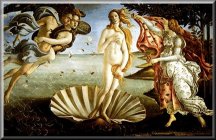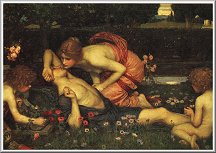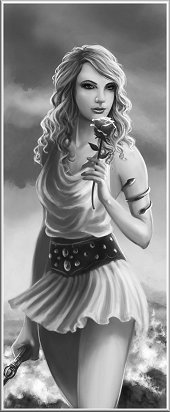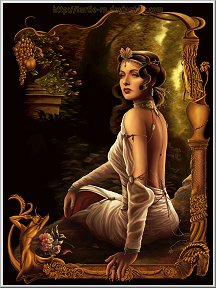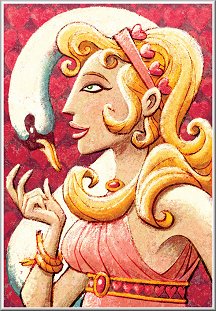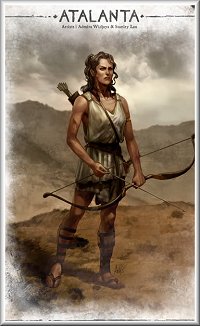APHRODITE, GODDESS OF LOVE
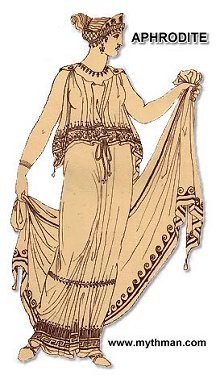
LATIN - VENUS
PAGE TWO (page one is here)
In addition to her irresistible looks Aphrodite had a magical golden girdle, made by Hephaestus, that when worn compelled anyone she wished to desire her.
Later myths and poems say that the goddess of
Love had risen from the sea foam on a seashell after Cronus tossed his
father Uranus' severed genitals there.
Her name was thus explained as "foam-risen" coming
from the Greek word 'Aphros', which means 'foam'.
Both Aphrodite and the Queen of the Underworld,
Persephone, loved a handsome young mortal named Adonis. The two
goddesses created such a stir that Zeus was asked to decide Adonis'
fate. Zeus ruled that Adonis could spend one-third of the year with
Aphrodite, one-third with Persephone, and the other third was his to do
as he wished.
Needless to say, Adonis chose to spend his own time with Aphrodite,
until he was gored to death by a wild boar (some say it was Ares, the
jilted lover, who killed Adonis in the form of a boar).
Aphrodite wasn't all lovey-dovey. She could be harsh to those who defied her. Because the Lemnian women did not honor her, she inflicted a foul smell on them and caused their husbands to consort with Thracian women. The Lemnian women, abandoned by their husbands, killed all the men on the island and established a society of women.
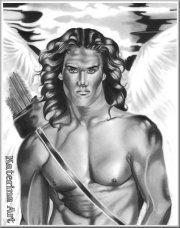
APHRODITE'S SON EROS
by KATERINA ART
CLICK TO ENLARGE
Both Aphrodite and the Queen of the Underworld, Persephone, loved a handsome young mortal named Adonis. The two goddesses created such a stir that Zeus was asked to decide Adonis' fate.
Zeus ruled that Adonis could
spend one-third of the year with Aphrodite, one-third with Persephone,
and the other third was his to do as he wished.
Needless to say, Adonis
chose to spend his own time with Aphrodite, until he was gored to death
by a wild boar.
Some say it was Ares, the jilted lover, who killed
Adonis in the form of a boar. Indeed, that was the case. Ares had
witnessed Aphrodite's love for Adonis and felt extreme jealousy.
How come she never loved him so passionately, he thought to himself. So
the jealous lover used his godly powers to transform himself into a
ferocious wild boar.
Adonis, never one to shy away from a challenging hunt, took the bait and
pursued the disguised god into the forest.
Event though the handsome man put up a fierce fight, his spear had no
effect on the god/boar. The beast took the opportunity to gore Adonis.
A crimson flower sprang up where each drop of his
blood had stained the earth.
It is said that every year the Greek maidens mourned for
him and each spring they rejoiced when his flower, the blood-red
anemone, the windflower, was seen blooming again.
Anchises,
King of the Dardanians, another one of her mortal lovers, bragged about
his conquest of Aphrodite in a tavern while buzzed on cheap wine,
causing Zeus, the king of the Olympian gods, to strike him with one of
his patented thunderbolts for his impudence.
Aphrodite intervened and deflected the bolt with her magic girdle into
the feet of Anchises. He lived, but was so weakened by the shock that he
never stood upright again.
They had a famous son named Aeneas, who
fought in the Trojan War and later moved on to Italy. The Romans
believed many of their eminent families descended from Aeneas.
Aphrodite
set in motion the Trojan War. She promised the shepherd called Paris
that Helen, the most beautiful mortal woman in the world, would be his
if Paris chose Aphrodite over Athena and Hera in a beauty contest.
Paris
took the bait, picked Aphrodite, and when Helen ran away to Troy with
Paris, the enraged Greeks gathered a mighty fleet and army and attacked
the great city. Thus began the Trojan War, leading to the fall of mighty
Troy.
Aphrodite would often help young people in love: Atalanta, a virgin huntress, and swift as a deer, used to force her wooers to race before her, but if she caught them she would put them to death. If anybody survived she would marry him.
A man named Melanion (also known as Hippomenes) had a
crush on beautiful Atalanta, but was astute enough to know he had no
chance to beat her in the race.
After the young man beseeched the
Goddess of Love for her help, Aphrodite gave Melanion three golden
apples, which he scattered on the ground as he ran. Atalanta could not
help but stop to pick up the exquisite and magical fruit, and was thus
beaten in the race, becoming his wife.
But Aphrodite wasn't all lovey-dovey. She could be harsh to those who defied her. Because the Lemnian women did not honor her, she inflicted a foul smell on them and caused their husbands to consort with Thracian women. The Lemnian women, abandoned by their husbands, killed all the men on the island and established a society of women.
When Aphrodite caught her lover Ares in bed with Eos (Dawn), she cursed his lover with a constant longing for young mortals. When the Sirens refused to yield their virginity to either mortals or gods, Aphrodite turned them into birds.
Her power was immense, and her victims included many very famous women in mythology, including Helen, Medea, Ariadne, Phaedra and Hippodameia, to name but a few.
It's been written that Aphrodite's son was Eros (Love, Cupid), a very wicked and mischievous boy some say, lacking all manners. The brat spent his time in running all night from building to building, and with his love arrows breaking up respectable homes. Nobody was immune to his capricious nature, not even Zeus, in whom Eros often inspired sexual desires.
Her attendants were the Horae (Hours, Seasons, who are worshipped as the wardens of the sky and of Olympus and are also said to attend to the Sun god, Helios) and the Three Graces (Aglaia, Euphrosyne and Thalia, known in Greek as the Charites); Flora and Zephyrus were ready to do her bidding as well.
She was the patroness of gardens and gardeners as well as lovers. The myrtle was her tree; the rose, lily, hyacinth, crocus and narcissus were also sacred to her.
Her animals were the swan, the dove, the sparrow and the dolphin.
The principal places of her worship in Greece were the islands of Cythera and Cyprus, but she was revered just about everywhere.
The presence of sanctuaries dedicated to Aphrodite on many islands suggests that she was a West Asian goddess who was brought to Greece by sea-traders.
Aphrodite appears to have been originally identical with Astarte, the Phoenician goddess of fertility and reproduction, whom the Hebrews called Ashtoreth.
The Romans called her Venus.
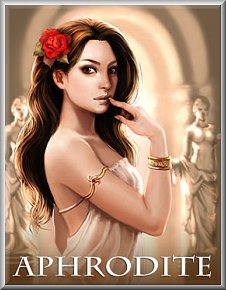
The poets liked to paint an idealistic picture of Aphrodite, filled with beauty and happiness - The winds flee before her and the storm clouds; sweet flowers embroider the earth; the waves of the sea laugh; she moves in radiant light. Without her there is no joy nor loveliness anywhere.
Aphrodite wasn't always sweet. When it suited her, she could be rather malicious and treacherous, and her influence over men was often deadly. She could turn the heart of any man to longing and passion, and it was said that when she spoke, even Zeus listened...
The lame god of the forge and metalworking, Hephaestus, was her husband, although he was the only god to be physically ugly...Needless to say, Hephaestus considered himself the luckiest god on Olympus.
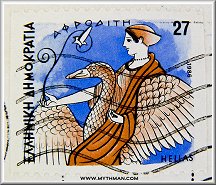
GREEK APHRODITE STAMP
CLICK TO ENLARGE

[HOME] [MYTHOLOGY'S EFFECTS ON
MODERN SOCIETY][OLYMPIANS]
[GALLERY] [MAJOR
GODS] [MINOR
GODS] [HEROES]
[CONTACT]
[LOVE STORIES]
[MYTH OF THE MONTH]
[FUN STUFF] [CREATURES]
Web, myth narration and graphics created and
maintained by Nick Pontikis
Copyright © 1995 Nick Pontikis
Thanasi's Olympus Greek
Restaurant
Copyright 1999
mythman.com
greekmythologytoday.com
mythmaniacs.com
The Myth Man persona copyright 1988 Nick Pontikis


